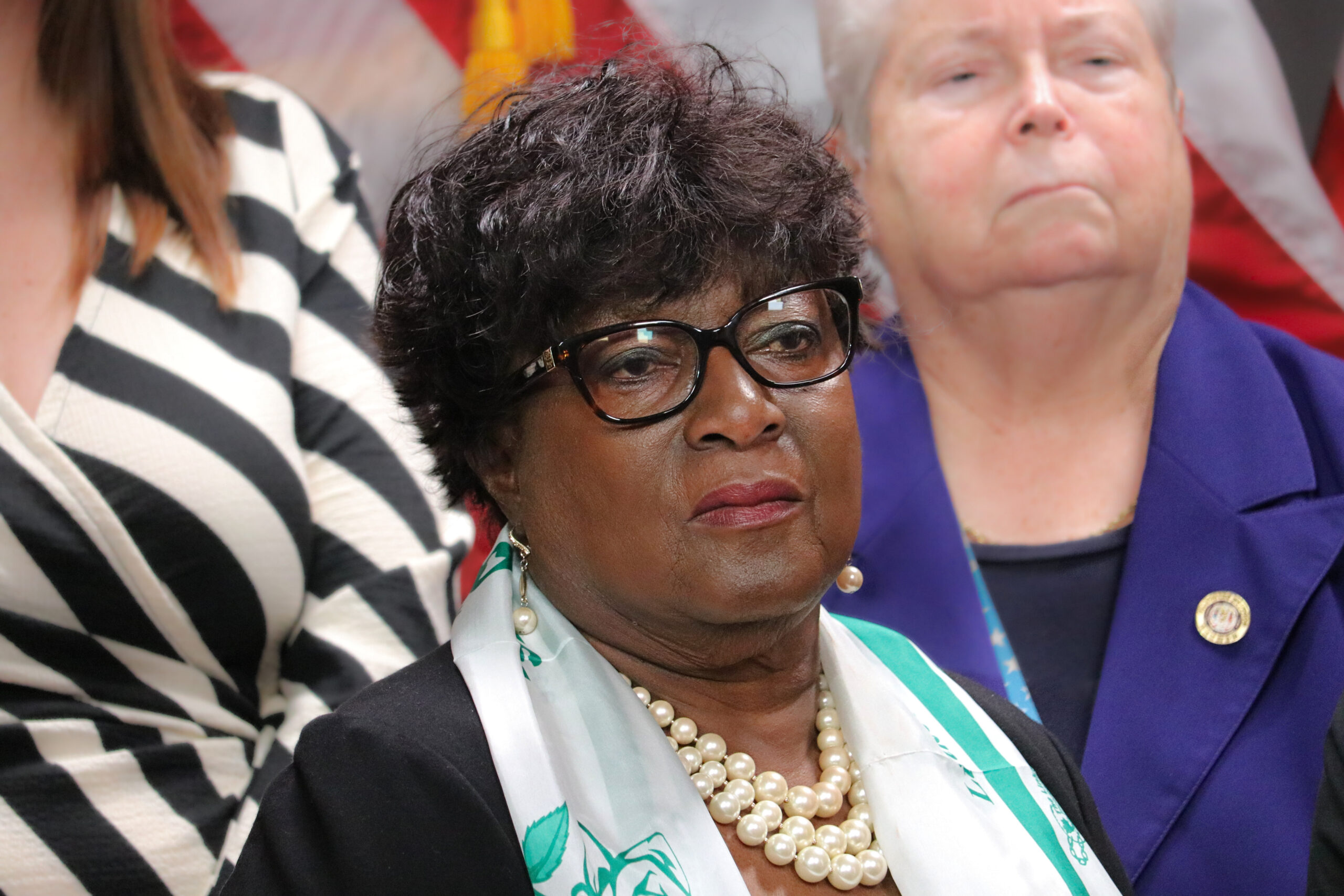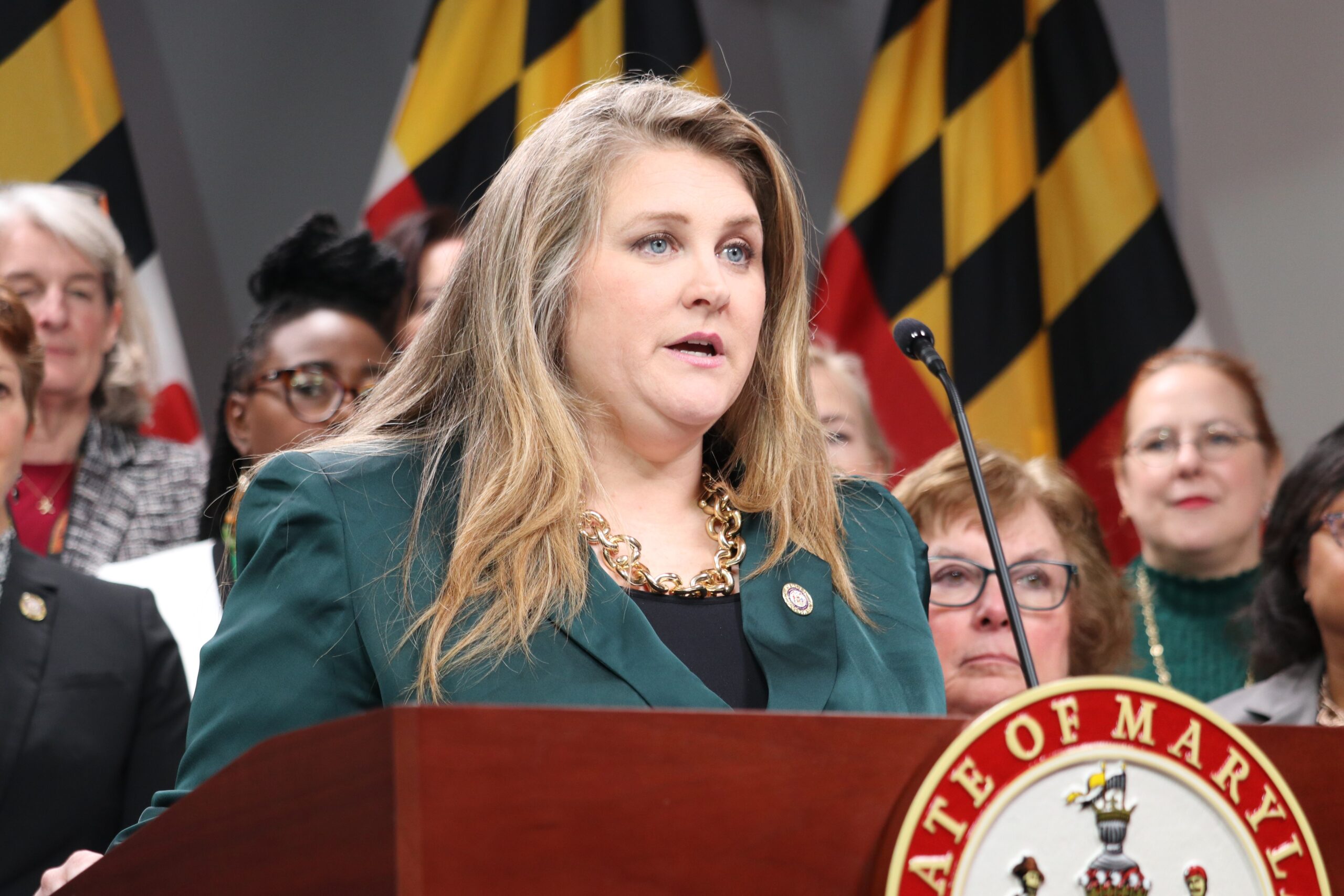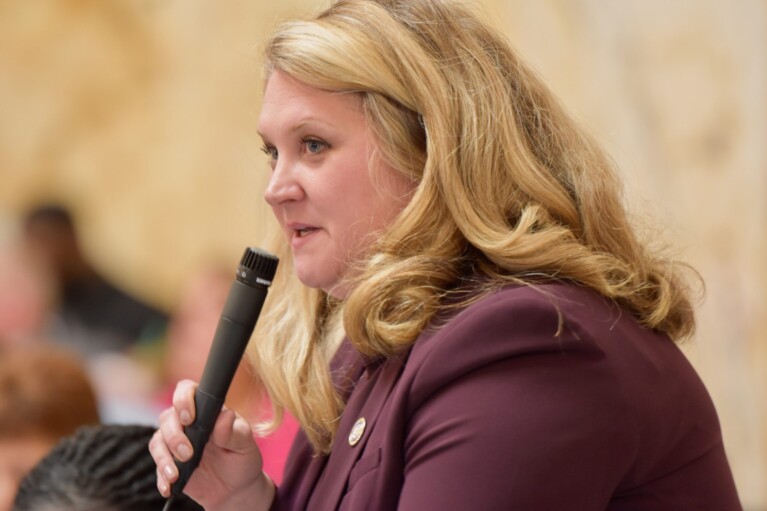Legislative women’s caucus still divided — only Democrats installed on executive board

When Del. Lesley J. Lopez (D-Montgomery), outgoing president of the Women Legislators of Maryland, rises on the House floor Friday to announce the new line-up of the women’s caucus executive board, the list will, for the second year in a row, contain only Democrats.
Last year, in an acrimonious split, the caucus elected Lopez as its leader — even though informal caucus rules dictated that a Republican, Harford County Del. Lauren Arikan, was next in line. Democrats said they were uncomfortable elevating a vocal conservative like Arikan with an acerbic rhetorical style to the top job of the traditionally bipartisan caucus, even though she had promised to keep partisan politics out of caucus deliberations. All 11 Republican women in the General Assembly at the time resigned in protest.

Del. Lelsey Lopez (D-Montgomery) outlines priorities of the Women’s Caucus during the 2023 General Assembly session. Photo by Danielle E. Gaines.
Lopez quickly vowed to try to heal the wounds, and even sent handwritten notes to each of the Republican women in the legislature, but did not encounter much success. A few Republicans have attended some caucus events over the past year “and don’t make a big production of it,” Lopez said. These included a Women’s History Month breakfast with Gov. Wes Moore (D) at Government House last month. But no Republican has paid the $150 annual membership dues, so they weren’t eligible to vote this week in the caucus leadership elections, she said.
More significantly, Republicans and Democrats say, women lawmakers seem unable to come together at the moment — and suggest the fissures may be more than just ideological. The legislature currently has 72 Democratic women and just eight Republican women.
“I think this has been the most dramatic thing that I’ve experienced in my time here, and that’s saying something,” said Del. Rachel Muñoz (R-Anne Arundel), who joined the House in late 2021. “I think there are some long-term grudges and there’s bias and there’s a lack of trust. So the two sides are unable to come together and even have a conversation. And it’s sad.”
In an apparent effort to heal wounds, Muñoz was nominated for a position on the women’s caucus executive board, at the suggestion of Del. Shaneka Henson (D-Anne Arundel), who represents a nearby district and has an adjoining office in the Lowe House Office Building. Lopez and other Democrats then encouraged Muñoz to seek the position.
“I saw it as sort of an olive branch and perhaps an opportunity,” Muñoz said.
But when the lawmaker checked in with her Republican colleagues, they advised her not to seek the slot. She reluctantly complied.

Rachel Muñoz. Campaign photo.
“It’s a very sensitive topic and people are highly charged,” Muñoz said.
Lopez said she didn’t understand why some Republican women were pressuring their colleagues to avoid participating in the caucus, especially when conservative Republicans lost many of their races in Maryland last year — and when the next election is so far off.
“We’re four years away from the Republican primary,” Lopez said. “The extremists who ran in the [last] primary, like [GOP gubernatorial nominee] Dan Cox, didn’t win.”
The Women Legislators of Maryland is a 51-year-old organization — the oldest women’s caucus in any state legislature — and has traditionally been bipartisan, though it has been dominated by Democrats given the partisan lean of the state and the General Assembly.
Usually in the women’s caucus, board members have worked their way up the leadership ladder and for the past several years, the group has informally agreed that a Republican could serve as president every three years — though that’s not written in stone. Still, when the caucus last year bypassed Arikan, who had been elected vice president in 2021, in favor of Lopez, who was first vice president and by tradition would not have been expected to take over until this year, Republicans were incensed.
“It was a lot over the years,” said Del. Teresa E. Reilly (R-Harford). “We asked for certain things and they never came about. It all just came to a head.”
Del. Kathy Szeliga (R-Baltimore County), a leading conservative and close ally of Arikan’s, said there’s no reason for Republicans to rejoin the caucus and that GOP members have occasionally discussed setting up their own.
“The process was so disrespectful last year and the agenda is very partisan,” she said.
Del. April Rose (R-Carroll) said she makes women’s issues a priority in her legislative work but also did not see value in re-engaging with the women’s caucus.
“We fight over a lot of issues already on the [House] floor, so I don’t feel the need to fight it out in the caucus,” she said.
With an all-Democratic membership, the women’s caucus advanced a notably progressive agenda for this legislative session — a dramatic contrast to many years when women lawmakers came together publicly over family law, workplace and health issues but tended to avoid more politically divisive matters like abortion rights. This year, the caucus leaned into abortion rights, an issue that became magnified after the U.S. Supreme Court struck down decades-old abortion protections in the 1973 Roe v. Wade case.
Abortion has been considered settled law in Maryland since voters overwhelmingly approved a ballot measure preserving reproductive rights in state law in 1992, but the erosion of federal abortion protections compelled many state lawmakers to work to make the laws even stronger here — and to offer protections to women from out of state who seek abortions in Maryland.
Several Democratic women said they’ve detected more belligerence and name-calling from their GOP colleagues this year over abortion and a raft of other issues — not just during legislative debates but on social media posts.
“There may be no more branches left on the olive tree,” Lopez said.
Now, the Maryland Republican Party is getting in on the act. The state GOP released a statement Thursday from Chair Nicole Beus Harris and two other Republican leaders accusing the Maryland House of turning its month-long Women’s History Month celebration “into Democrat Women’s History Month.”
“When the Maryland House of Delegates is in session in March, a female delegate highlights a notable woman at the end of each session. It is a lovely tradition. But we were disappointed to learn that the Maryland House of Delegates did not ask even one Republican woman to participate last month!” Harris, Republican National Committeewoman Nicolee Ambrose and former state chair Diana Waterman wrote in the statement.
They went on to blast what they characterized as Democratic women’s extreme agenda and called excluding Republicans from Women’s History Month speeches in the House “a new low” (Szeliga did in fact offer a tribute on the House floor to Ellen R. Sauerbrey, the former House minority leader and two-time GOP nominee for governor, and received warm bipartisan applause for her speech, even though she had not been invited by House leaders to speak).
“With all due respect, please change the name of the Women’s Caucus to the Maryland Democrat Women’s Legislative Caucus,” Harris, Ambrose and Waterman concluded.
The caucus going forward: ‘It’s a wait and see situation’
It’s obvious that as centrists depart the legislature, as the Democratic caucuses in the House and Senate move to the left while the Republican caucuses move to the right, the same trends are evident among women lawmakers in their respective parties.
“We’ve had wonderful relationships [across party lines] in the past,” said Del. Edith J. Patterson (D-Charles), who is set to take over as women’s caucus president from Lopez after the legislative session ends.
Besides Patterson, the new women’s caucus leadership roster that will be announced Friday features Del. Nicole A. Williams (D-Prince George’s) as vice president, Del. Dana Jones (D-Anne Arundel) as first vice president, Del. Michele Guyton (D-Baltimore County) as second vice president, Del. Brooke Grossman (D-Washington) as secretary, and Dels. Jennifer White (D-Baltimore County) and Linda Foley (D-Montgomery) as at-large board members.
The caucus is also changing its bylaws, so that board members won’t automatically advance up the leadership ladder. In other words, it’s no longer assumed that Williams will take over in 2024.
For her part, Patterson said she “absolutely” believes Republicans and Democrats can find harmony in the women’s caucus.
“It will take a decision of Republican women,” she said. “It’s a wait and see situation.”
Bryan P. Sears contributed to this report.




 Creative Commons Attribution
Creative Commons Attribution